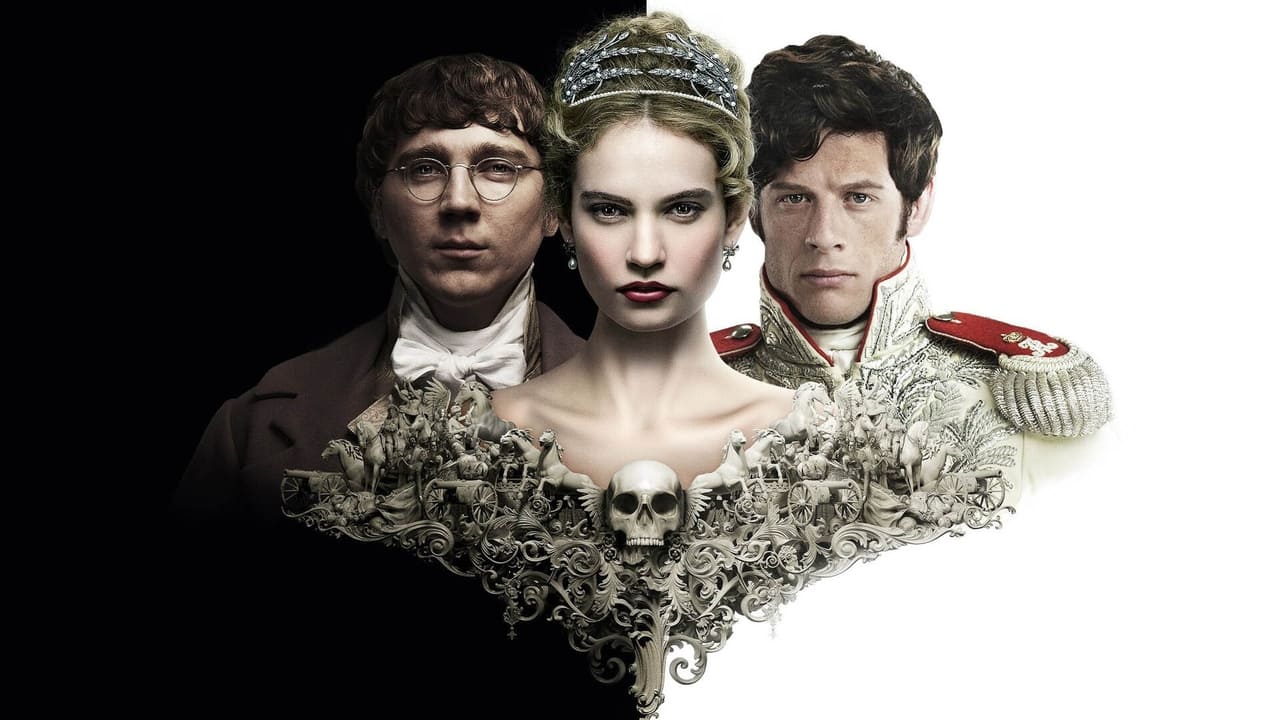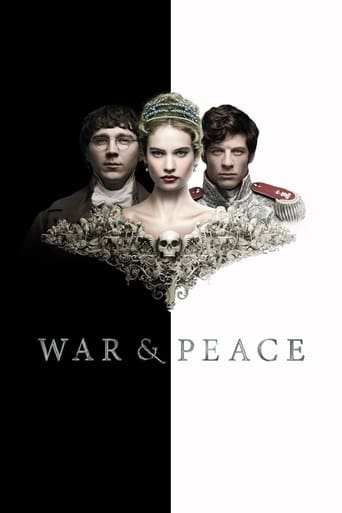

I can't tell you how curious I was to see this. Being both a Russian and a crazy fan of Andrew Davies adaptations. And, in a nutshell, I found W&P series heart-warming and absolutely satisfying. Truth be told - even finally opening up the greatness of this famous book to me. Never mind that it was written by my compatriot : ) A lot of students in Russia find the Leo Tolstoy masterpiece too big and too daunting. But it's a literature landmark, and you have to read it at school, at least skim through it : ) And because of that whopping size, it's hard to perceive the story as a whole - you just get too exhausted waiting for this or another thread to pick up again. However, Mr Davies shone his genius on us one more time - he took the essence of the story and presented it to a modern viewer in a digestible and tasty way. A big applause. So, the choice of scenes for the script I find marvellous. Our own movie filmed by Sergey Bondarchuk is loved by many, especially by the older generation. But I've always thought it had too much emphasis on the war side of the novel. And what do we, women, watch period dramas for? : ) Of course more for the relationship side, to watch multilayered characters unfold. And Andrew masters this to perfection. It flows easily, one could watch all 6 episodes in a row - except that it's not a light and romantic Pride & Prejudice. This is deeper and more dramatic food for thought, which requires a break somewhere along the way. The cast is generally very-very-very good. Pierre is portrayed brilliantly. I can't think of a better or a more sincere one. I also loved the choice of actress for Mariya Bolkonskaya, watching her I could forget this is a foreign actress. Can't say the same about Natasha Rostova, though. To me this was the worst casting fiasco. I'm sure Lily James tried her best. But I, personally, found her annoying in this part. I would prefer to enjoy her performance in Downton Abbey. On the negative side are the erotic scenes. They are soooo off here. Can you imagine Mr Wickham and Lidiya having fun on the dining room table? I doubt the British audiences would approve of it in the adaptation of their beloved classic. So I couldn't understand why it was included here. The production isn't Tudors, so that's something which is expected least of all. The other day I read a review by a Russian film critic, which said, "This wouldn't be a truly British adaptation if it didn't end with a scene of domestic bliss" : ) Ironic as it may sound, I find it a good thing and something to thank the production team for. Why not? I enjoyed the final scenes, even though in the original book some less satisfying points were highlighted by the author. All in all, I felt the series was filmed with attention to detail (as best one can), respect for the original material (for the most part), as well as the nation's culture and traditions. After the disastrous "Anna Karenina" and "Onegin", which ruined 2 other all-time classics of the Russian literature, "War and Peace" by Andrew Davies was a pleasant treat. I just wish this outstanding man 200 years of a happy and productive life, so the world could enjoy more of his projects.
... View MoreHonestly i'm quite disappointed, I think that BBC could have done it much better. What I actually didn't like is the fact that there's practically no references to this period in Russia where every single aristocrat was mainly speaking french. This is really ridiculous that even Napoleon speaks English (although the actor is french). I truly understand that this is an English film but at the same time it's a film about the greatest war of two greatest cultures who have had something in common. I wouldn't mind to read subtitles. This is very important I think to show that the Russian aristocracy being so feared of Napoleon stayed still at the same time in love with french traditions and culture so they couldn't stop to speak french sometimes (there were someone who tried to speak Russian as the sign of the protest to Napoleon). The novel is fulled by the parts and dialogues in french! Also I think if the actors don't speak Russian they should absolutely not sing in Russian, it's kind of silly to hear this (there are a few moments where you can hear a real Russian song and right after that the singing with a strong accent.I also didn't like the main characters. Sometimes you can hardly understand what are they thinking. Pierre is full of pity that we can't see how passionate his is in his ideas every single time, but I think that is the only actor who was close enough for his character. Natasha looks more silly that naive, Andrei is too motionless and we don't see how deeply he had changed. Anatoly is so rude and tough, that's even embarrassing as his sister (the story shows a reference to the film Les Liaisons Dangereuses but this is so far from the novel).Well, all I can say, watch the Russian film, it is the best for the moment.
... View MoreSubmitted on behalf of my Russian immigrant mother-in-law and student of Russian literature, who was very disappointed in this film version of War and Peace. War and Peace is about three aristocratic families: St. Petersburg's Kuragins are close to the Tsar (Tolstoy uses irony to show his dislike of them); the provincial Rostovs, who are in the process of losing everything; and the Bolkonskys of the old aristocracy, who are favored by the author. The novel is huge and extremely detailed in its descriptions of characters and details of Russian life in the beginning of 19th century.Leo Tolstoy intended his historical novel to be a majestic and profound one. In this film adaptation, "War" remains faithful to the novel. This is evident in the majestic panorama of the battle at Borodino, or the tragic escape of the broken and hungry French Army as they advance through the snow, and the impossible roads of a vast and empty Russia. However, "Peace" leaves much to be desired.At the party of the house of the Grand Dame Anna Pavlovna Sherrer, one of the guests, Princess Drubetskaya, asks Prince Kuragin to find her son a safe (comfortable) position in the Tsar's army. In her gratitude she kisses Kuragin's hand. Why? Only servants kissed the hands of their owners, or children kissed the hands of their parents. So why does the princess kiss Kuragin's hand?The house of Count Rostov in Moscow, shown in the movie several times from its backyard with livestock, such as pigs, chicken, etc., is not an accurate depiction of an aristocrat's home. No aristocrat's home, especially in a city such as Moscow, would have such a backyard. Furthermore, Pierre would never enter Rostov's home, or any home for that matter, through the backyard. That is a servant's entrance.There is a certain responsibility when working with historical material. One must show respect to the epoch being shown and understand the significance of decorum, protocols of behavior, etc. It is equally important to have actors who correspond to the characters of the novel and the times in which they lived. Tuppence Middleton's portrayal of Helene Kuragina (later Bezukhova) was taken too far from the character of this classic. Tolstoy wrote of Helene's beauty as if she were a perfect Greek statue. Napoleon, seeing her in the theater, praised her beauty. Pierre, standing next to her, wanted to own this beauty. So, the scene of her having sex on the dinner table is so modern and vulgar that I am afraid poor Count Leo Tolstoy turned around many times in his grave, as the Russian proverb says.Similarly, the character of Anatol Kuragin is also miscast. Callum Turner's portrayal of this character on screen is so far from how Anatol is developed in the novel that it leads to a fundamental misunderstanding of Natasha's behavior in the movie. In the novel, the young, beautiful, and smart Natasha (with her inner understanding of people) sees extreme beauty, bravery, confidence, and arrogance in Kuragin, and she is smitten. It is impossible to accept while watching this movie why Natasha has any passionate desire to run away with Anatol, who is played by a stiff, uncertain, and unhandsome actor. I could go on in detail about several other characters and, to a point, I will: The stiffness and monotonousness of James Norton does not show all the transformations through the life of Tolstoy's favorite character, Andrei Bolkonsky. There is some luck despite the wrong appearance of the actor who plays Pierre Bezuhov. In the novel, Pierre is a huge bear of a man, sometimes even comical looking. Though he may not look his part, fortunately, the talented Paul Dano tries to play him accordingly to L. Tolstoy's idea of Pierre. And it seems Dano is the only actor here who read the novel and understood his character.This film did not do justice to Tolsoy's telling of Russian aristocracy in the 19th century; it looks more like the petty bourgeoisie of some unknown country. But, thanks to the movie, I reread the novel with great pleasure. I am afraid, though, I and Paul Dano were the only ones who did.
... View MoreRight, I'll cut to the chase, I've never read the book; War and Peace and the BBC Adaptation is the first time I've ever paid it any attention.My main draws for watching the show were Lily James (Downton Abbey) and Tom Burke (The Musketeers) and a growing love for 'period dramas'...I was not disappointed. Lily James was adorable and endearing as 'Natasha' and portrayed the role of a 'ruined woman' very well. Tom Burke was transformed as the wolfish 'Dolokhov' and as always Jim Broadbent failed to disappoint.The show also introduced me to several new actors whom I will be keeping a close eye on, namely Paul Dano who played 'Bezukhow'.The costumes were beautiful and the settings stunning, a joy to watch!
... View More